An African Adventure that Made Me a Better Person Past Review
By A student (Art History, Criticism and Conservation., Manhattanville College) - abroad from 09/05/2012 to 12/05/2012 with
Carleton Global Engagement: Arts and Culture in Cameroon
I learned how to be more assertive and how to truly challenge myself. It was most definitely worthwhile. I recommend this program to any student who is willing to put themselves out of their comfort zone. Through this program, you learn how big the world really is and the opportunities of life after college seem endless. The world is opened up for you.
Review Photos
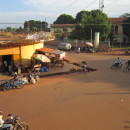
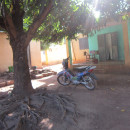
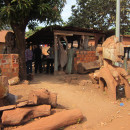
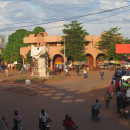
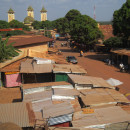
Personal Information
| How much international exposure did you have prior to this program? | 0-2 weeks |
Review Your Program
|
* Overall educational experience
Academic rigor, intensity, resources, etc. |
Personally, I like AEA's program because its focus was not on the academic rigor, but instead the artistic apprenticeship. Don't get me wrong- the classes were still challenging, especially the Maninkakan language class. |
|
* Host Country Program Administration
On-site administration of your program |
Our program director was always supportive and available to the student program members. I felt like I could turn to him with any problems or concerns. |
|
* Housing:
How satisfied were you with your living arrangements? |
|
| * Food: |
The food in Kankan (and many areas of West Africa) consists of rices, sauces, different types of root vegetables, eggs, and meats such as fish, chicken, lamb, and beef. Meat items are not as common as the other food items, but I still ate meat fairly often. I was a vegetarian before studying abroad, but I decided to eat meat while I was in Kankan because it helps you assimilate to the culture easier. |
|
* Social & Cultural Integration:
How integrated did you feel with the local culture? |
I felt very integrated into the culture through the homestay living experience, as well as through my artistic apprenticeship. I was constantly speaking French or Maninkakan, eating the local food, and commuting to work by foot or by taxi moto. I felt very assimilated by the end of my trip. |
|
* Health Care:
How well were health issues addressed during the program? |
I did not have any personal direct experience with the healthcare system in Kankan, but my two individuals on my program got sick, and I helped care for them. During this time, I experienced the healthcare system second hand when a doctor came out on call to our house to take care of one of the students. This program will provide for you if you are sick. |
| * Safety: |
I never had a bad experience regarding safety in Kankan. As with any city, you have to be cautious and aware of your surrounding. The main advice I have to give is that you should be aware of the military (always carry your passport, yellow fever vaccination card, IDs, cell phone, etc. with you in case a military personnel stops you), and to also be cautious when taking taxi motos (make sure it is a legit taxi moto and not some random man driving a personal taxi). |
| If you could do it all over again would you choose the same program? |
Yes
|
Finances
|
* Money: How easily were you able to live on a student's budget?
(1 = not very easy/$200+ on food & personal expenses/week, 2.5 = $100/week, 5 = very easily/minimal cost) |
Living abroad in Kankan was much cheaper than living in the U.S. for a semester. The cost of living is much lower in Kankan. Meals were included with our program expenses, as well as taxi moto fees. The only thing that wasn't covered was extra snacks. Also, if you have an artistic apprenticeship that involves extra art supplies (like paint, wood, tools, etc.), then you have to pay for that yourself. |
| Not including program expenses, about how much money did you spend on food and other expenses each week? | USD $15 |
| Do you have any general money-saving tips for future study abroad participants? | Students should bring money for buying gifts or souvenirs, but other than that, my advice is to simply realize that the program fees that we pay up front cover our food and traveling expenses. If you don't buy lots of extra snacks and extra art supplies, then you shouldn't have any problem keeping to a budget while in Kankan. |
Language
| * Did your program have a foreign language component? | Yes |
|
How much did the program encourage you to use the language?
0 = No encouragement, 5 = frequent encouragement to use the language |
|
| How would you rate your language skills at the beginning of the program? | None |
| How would you rate your language skills at the end of the program? | Beginner |
| What was the highest level language course you had completed prior to departure? | No Maninkakan language course before. French I had taken for 2 years. |
| How many hours per day did you use the language? | |
| Do you have any tips/advice on the best ways to practice the language for future study abroad participants? | Speak to your homestay family and your artistic mentor in the native language as much as possible. After dinner finishes or after your tasks are done, hang around and ask your family questions to practice the language. |
Other Program Information
|
* Where did you live?
Select all that apply |
|
|
* Who did you live with?
Select all that apply |
|
|
* Who did you take classes with?
Select all that apply |
|
| About how many local friends did you make that you will likely keep in touch with? |
A Look Back
| * What did you like most about the program? |
|
| * What could be improved? |
|
| * What do you know now that you wish you knew before going on this program? | I wish I knew that I was stepping into a way of living that is nothing like I had ever experienced in the United States. In some ways, there is no way to prepare yourself for that until you actually experience it. I just would've told myself to keep my mind REALLY OPEN for all the greatness that would come! |
Reasons For Studying Abroad
| To help future students find programs attended by like-minded individuals, please choose the profile that most closely represents you. |
The Nearly Native or Trail BlazerCraving the most authentic experience possible, perhaps you lived with a host family or really got in good with the locals. You may have felt confined by your program requirements and group excursions. Instead, you'd have preferred to plan your own trips, even skipping class to conduct your own 'field work.' |








